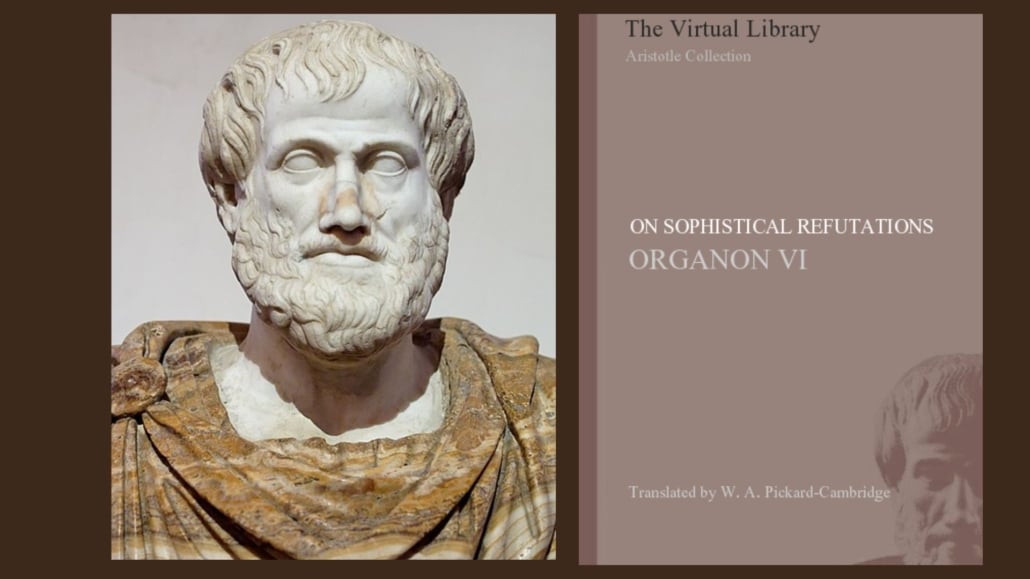How Journalists Use Logical Fallacies
There are a number of well-known logical fallacies, tricks or devices used by journalists to get a better story, or a more interesting interview.
If you are going to be a media spokesperson and haven’t heard the term ‘logical fallacy’ it’s worth getting to grips with its meaning. A fallacy in this context is the use of an invalid argument or faulty reasoning.
I have not studied the debating rules of Ancient Greece but I know enough to understand they are often very relevant to my work. Wikipedia tells me that Aristotle created a list of thirteen ‘tricks’ used by debaters to mislead or misrepresent. His list was called Sophistical Refutations or De Sophisticis Elenchis, but they have been added to since. Indian debaters also worked on a similar list in the 6th century BC. And an English scholar, Richard Whately (1787-1863) produced his own list and some further categorisation.

I am tempted to conclude there is nothing new under the sun, but that would itself be a logical fallacy. The three examples above do not prove ‘there is nothing new’ in this world, in any way at all.
If you are likely to face aggressive or difficult questioning in a media interview, there are a few logical fallacies you might want to look out for: spotting them might give you a more convincing rebuttal and stop you being distracted by unhelpful lines of argument.
The Strawman
This occurs when an interviewer exaggerates the interviewee’s position and the consequences, in order to provoke a denial.
For example: ‘Rishi Sunak is a multi-millionaire, he knows nothing and cares little about how ordinary people are coping with the cost-of-living crisis.’
A rather more robust version of this exact argument is used by Rosie Ramsey in this ‘Shagged, Married, Annoyed’ podcast (37 m 25 seconds in). Thanks to Politico for sharing this with me. Where would I be without their morning briefing!
In either iteration, this is a logical fallacy because there is no genuine connection between Sunak’s wealth and what he knows or what he cares about. He may not care, or know, but his wealth does not prove this either way.
In an interview, it is tempting to jump to the defensive, ‘I do care’ for example.
But it can help to unpick the fallacy: ‘Let’s concentrate on what Sunak says and does rather than how much he has in the bank…’
‘You are at fault’ fallacy
This is not one I have read about elsewhere but which I see regularly. The journalist will make it sound as if the interviewee is responsible for some awful thing.
Examples of this pop up all the time when I am training UN spokespeople. In a large programme of assistance, for example in Haiti, where earthquakes, cholera, poverty, government collapse and gang violence are making life utterly miserable for thousands, many UN agencies will get questions along the lines of ‘how can you let this happen’.
What is even more interesting to me is that decent people who work night and day to help in these situations, genuinely feel guilty for their ‘failure’.
As a media trainer, my job is to remind them that they are helping: the situation is not their fault. I must also train them to appropriately point this out to journalists.
So rather than say ‘We could do better, some mistakes have been made’ it may be more advisable to remind the interviewer and listener that there are many factors creating the humanitarian crisis that is Haiti today.
Unhelpful generalisations
Again, a typical example of this is where an interviewer generalises in a way that sounds plausible.
For example: ‘Those who voted for Brexit want to see an end to immigration. They will be pleased to see illegal immigrants deported to Rwanda.’
Here it is clear that some people who voted for Brexit may indeed want an end to immigration, but there are many other reasons why people voted for Brexit. And the Rwanda policy is far from likely to have the support of all Brexiteers.
As an interviewee, you may wish to ensure the audience and the journalist is made aware of the incongruence, before dealing with the complications of immigration policy.
Personal attack
The core technique here is to assert that an argument is undermined by the personal history or record of the person making the argument.
A very familiar version of this would be:
A: ‘I believe that a well-funded, comprehensive, state education is best for the child, best for the family and best for society.’
B: ‘Well clearly, you don’t, you are sending your children to a private or selective school.’
At first sight, this seems obviously true: but a student of logic would quickly point out that you can believe in working for one idea while, in a particular set of circumstances, choosing to do something else.
In many ways, these are very difficult questions to answer. Huge amounts of effort go on behind the scenes, to find phrasing that will work to neutralise this type of question, without needing 20 minutes to explain the realities.
You need a short sentence such as: ‘When public policy fails, everyone is left making difficult choices. That’s why we want …. ‘
The false dichotomy
A false dichotomy is an example of one side oversimplifying to ensure there is a black and white argument. At its simplest, it is ‘if you are not with us, you are against us.’
For example: ‘If you want free trade you vote Conservative, if you care about the Welfare State you vote Labour’. A clear case of a false dichotomy. Voters do not have two choices but many. It is also possible to hold both beliefs or neither, and have some other important issue help you decide which way to vote. Journalists love to simplify complex arguments and often just for effect.
There are many more logical fallacies, and I would love to hear your stories of some that journalists have used in interviews.
At The Media Coach, we stress-test messages and reactive lines in realistic, mock-interviews. We do this online and in person. We have plenty of clients who would not face the cameras without our training. If you think we might be able to help, please contact us +44 (0)20 7099 2212 or enquiries@themediacoach.co.uk.
Strawman picture attribution Ard Hesselink on flickr
- Media Savvy Operators Know How to Place a Quote - May 21, 2024
- The Magic of Performance - May 14, 2024
- Our Top Tips: - May 8, 2024





The media have been cheerfully exploiting one fallacy for decades: post hoc, ergo propter hoc (“After this, therefore because of this”):
1. Newspaper gets tipped off about govt planning to take action to tackle problem X within the next few weeks;
2. Newspaper launches “campaign” to “compel” the govt to take action on “the scandal of problem X”
3. Govt duly announces rethink, and newspaper hails its triumph in “forcing” action on problem X….which was going to happen anyway. Readers convinced of success of “campaign”, as action followed its launch and must therefore must be the result of said campaign.
4. Triples all round.